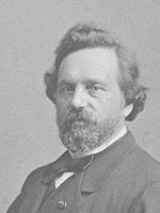
Franciscus Donders
Encyclopedia
Franciscus Cornelis Donders (Tilburg
, May 27, 1818 - Utrecht
, March 24, 1889) was a Dutch
ophthalmologist and medical scientist who did pioneering work on animal and vegetable heat, among many other things. He was a professor in Physiology in Utrecht from 1847 and was internationally regarded as an authority on eye diseases, directing the Netherlands Hospital for Eye Patients.
He was one of the founders of the science of ophthalmology
(with von Graefe and Helmholtz) and is primarily known for introducing prismatic
and cylindrical lenses for treatment of astigmatism
.
Donders also was the first to use differences in human reaction time to infer differences in cognitive processing. This concept is now one of the central tenets of cognitive psychology
— while mental chronometry
is not a topic in itself, it is one of the most common tools used for making inferences about processes such as learning, memory, and attention.
Tilburg
Tilburg is a landlocked municipality and a city in the Netherlands, located in the southern province of Noord-Brabant.Tilburg municipality also includes the villages of Berkel-Enschot and Udenhout....
, May 27, 1818 - Utrecht
Utrecht (city)
Utrecht city and municipality is the capital and most populous city of the Dutch province of Utrecht. It is located in the eastern corner of the Randstad conurbation, and is the fourth largest city of the Netherlands with a population of 312,634 on 1 Jan 2011.Utrecht's ancient city centre features...
, March 24, 1889) was a Dutch
Netherlands
The Netherlands is a constituent country of the Kingdom of the Netherlands, located mainly in North-West Europe and with several islands in the Caribbean. Mainland Netherlands borders the North Sea to the north and west, Belgium to the south, and Germany to the east, and shares maritime borders...
ophthalmologist and medical scientist who did pioneering work on animal and vegetable heat, among many other things. He was a professor in Physiology in Utrecht from 1847 and was internationally regarded as an authority on eye diseases, directing the Netherlands Hospital for Eye Patients.
He was one of the founders of the science of ophthalmology
Ophthalmology
Ophthalmology is the branch of medicine that deals with the anatomy, physiology and diseases of the eye. An ophthalmologist is a specialist in medical and surgical eye problems...
(with von Graefe and Helmholtz) and is primarily known for introducing prismatic
Prism (optics)
In optics, a prism is a transparent optical element with flat, polished surfaces that refract light. The exact angles between the surfaces depend on the application. The traditional geometrical shape is that of a triangular prism with a triangular base and rectangular sides, and in colloquial use...
and cylindrical lenses for treatment of astigmatism
Astigmatism (eye)
Astigmatism is an optical defect in which vision is blurred due to the inability of the optics of the eye to focus a point object into a sharp focused image on the retina. This may be due to an irregular or toric curvature of the cornea or lens. There are two types of astigmatism: regular and...
.
Donders also was the first to use differences in human reaction time to infer differences in cognitive processing. This concept is now one of the central tenets of cognitive psychology
Cognitive psychology
Cognitive psychology is a subdiscipline of psychology exploring internal mental processes.It is the study of how people perceive, remember, think, speak, and solve problems.Cognitive psychology differs from previous psychological approaches in two key ways....
— while mental chronometry
Mental chronometry
Mental chronometry is the use of response time in perceptual-motor tasks to infer the content, duration, and temporal sequencing of cognitive operations....
is not a topic in itself, it is one of the most common tools used for making inferences about processes such as learning, memory, and attention.
External links
- B. Theunissen. Franciscus Cornelis Donders 1818-1889, F.C. Donders: turning refracting into science, @ History of science and scholarship in the Netherlands.
- Picture, biography, bibliography and digitized sources in the Virtual LaboratoryVirtual LaboratoryThe online project Virtual Laboratory. Essays and Resources on the Experimentalization of Life, 1830-1930, located at the Max Planck Institute for the History of Science, is dedicated to research in the history of the experimentalization of life...
of the Max Planck Institute for the History of ScienceMax Planck Institute for the History of ScienceThe Max Planck Institute for the History of Science in Berlin was established in March 1994. Its research is primarily devoted to a theoretically oriented history of science, principally of the natural sciences, but with methodological perspectives drawn from the cognitive sciences and from... - P. Eling, Donders, Frans (1818-1889), Geneeskundige en fysioloog.
- Edwin Maes, Professor dr. Franciscus Cornelis Donders (Tilburg 27-5-1818, Utrecht 24-3-1889) Gravesite of Franciscus Donders.

